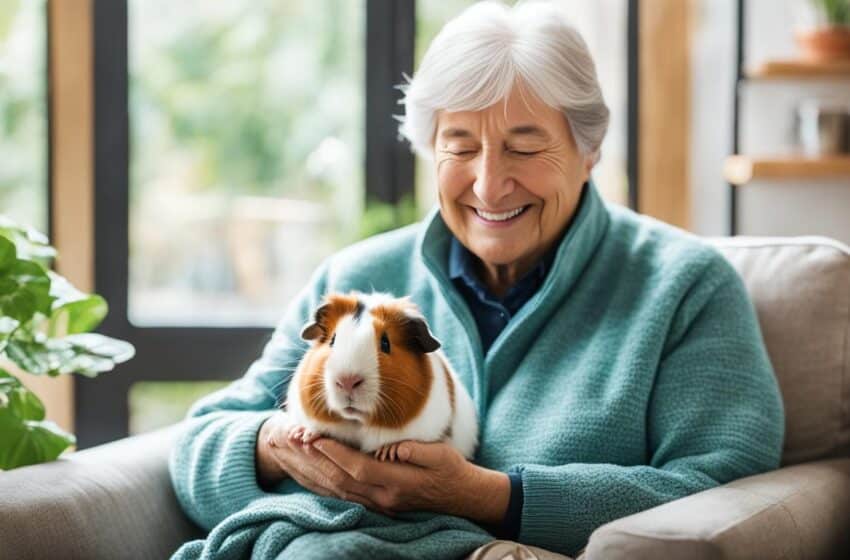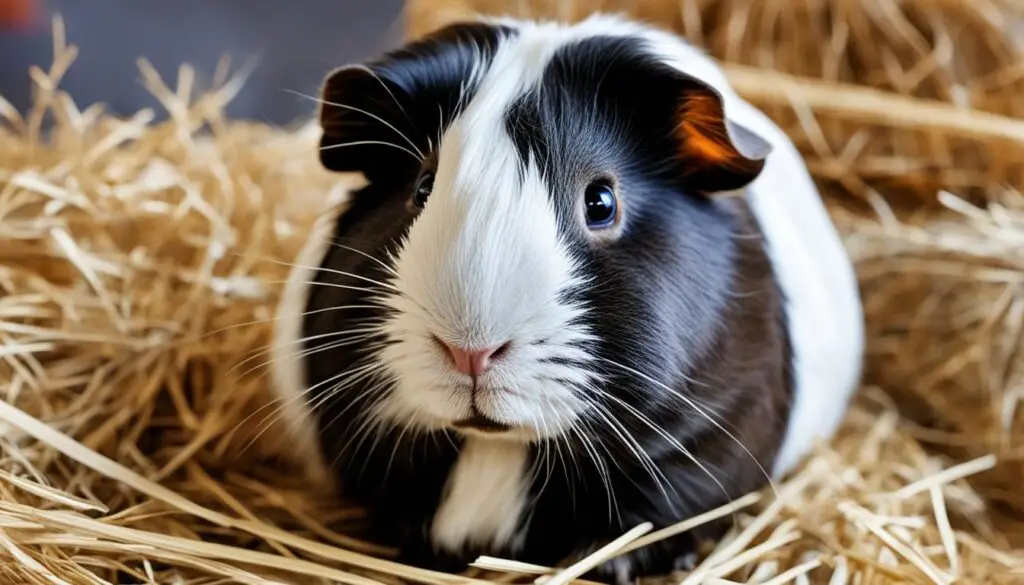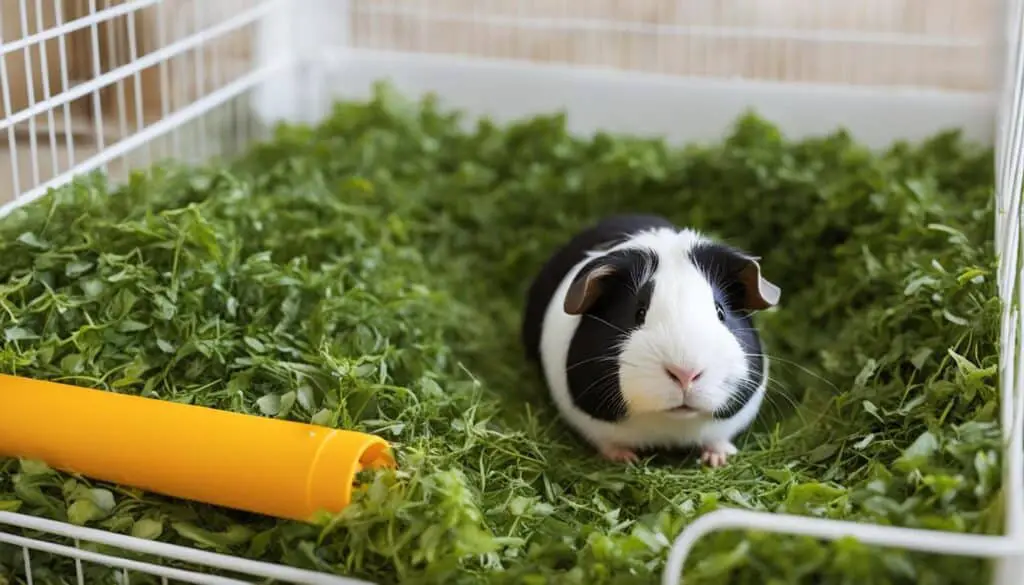Caring for Elderly Guinea Pigs: A Comprehensive Guide

As a professional who cares deeply about the well-being of all animals, I understand the importance of providing the best care possible to our furry companions, especially as they enter their golden years. In this comprehensive guide, I will share essential tips and advice on caring for elderly guinea pigs. Whether you are a seasoned guinea pig owner or new to the wonderful world of these adorable pets, this guide will equip you with the knowledge to ensure the comfort and happiness of your senior guinea pig.
Key Takeaways:
- Understanding the unique needs of aging guinea pigs is crucial for their well-being.
- Creating a comfortable living environment with proper bedding and hiding spots is important.
- Adapting their diet to meet the changing nutritional requirements of senior guinea pigs is necessary.
- Regular health monitoring and veterinary care are essential for their overall health.
- Observing any changes in behavior, appetite, or mobility can help detect potential health issues early on.
Understanding the Aging Process in Guinea Pigs
Guinea pigs have an average lifespan of 4 to 8 years, making them prone to age-related health issues. As they age, you may notice changes in their physical and behavioral patterns. According to experts, older guinea pigs are more susceptible to dental problems, arthritis, vision and hearing loss, and weakened immune systems. It is crucial to be aware of these changes and adapt their care accordingly.

As guinea pigs grow older, the aging process can manifest in various ways. They may experience difficulties in chewing due to dental problems, leading to weight loss and malnutrition. Arthritis can cause joint stiffness and reduced mobility, impacting their overall quality of life. Additionally, older guinea pigs may suffer from vision and hearing loss, affecting their perception of their surroundings.
It is essential to monitor your guinea pig closely and provide the necessary support to address these age-related challenges. By understanding the aging process, you can provide tailored care to ensure their comfort and well-being.
Common Age-Related Health Issues in Guinea Pigs
“Older guinea pigs are more susceptible to dental problems, arthritis, vision and hearing loss, and weakened immune systems.”
When it comes to dental health, aging guinea pigs are prone to overgrown teeth, which can cause discomfort and difficulties in eating. Regular dental check-ups and providing appropriate chew toys can help maintain their dental health.
Arthritis is another common issue among senior guinea pigs. This degenerative condition affects their joints, leading to stiffness and pain. Offering soft bedding, ramps for easy access to elevated areas, and low-sided food bowls can alleviate discomfort and promote mobility.
Loss of vision and hearing can also impact their daily lives, making it essential to ensure their environment remains familiar and predictable. This can be achieved by maintaining a consistent routine and avoiding sudden changes in their surroundings.
Adapting Care for Aging Guinea Pigs
Adapting the guinea pig’s care routine to cater to their specific needs is crucial as they age. Regular veterinary check-ups become even more important to detect and address any health issues early on. Consult with a knowledgeable veterinarian who can provide expert advice and guidance tailored to your guinea pig’s age and individual circumstances.
Providing a nurturing and enriched living environment is essential. Guinea pigs should have access to a spacious enclosure with ample opportunities for exercise, regular social interaction, and mental stimulation. Including hideouts and ramps in their habitat can help accommodate any mobility challenges they may face.
Creating a Comfortable Living Environment
Providing a comfortable living environment is crucial for the well-being of elderly guinea pigs. As they age, these adorable little creatures require special attention to ensure their comfort and happiness. Here are some key tips to create an environment that promotes their overall well-being:
Spatial Considerations
Guinea pigs need a spacious and secure enclosure where they can move around freely. A larger living space allows them to exercise and explore, keeping them physically active and mentally stimulated. Ensure that the enclosure is escape-proof and provides adequate ventilation.
Access to Essentials
Elderly guinea pigs should easily access food, water, and resting areas within their living space. Place food and water dispensers in areas that are easily reachable for them. Additionally, create comfortable resting spots, such as cozy hideouts, soft bedding, or hammocks, to cater to their needs for rest and relaxation.
Maintaining Cleanliness
A clean and odor-free environment is essential to prevent respiratory issues in elderly guinea pigs. Regularly remove waste, soiled bedding, and uneaten food from their enclosure. Make it a habit to clean and disinfect their living space to ensure optimal hygiene.
Tip: Adding a layer of soft bedding, such as hay, straw, or fleece, can enhance the comfort of elderly guinea pigs. It provides a cozy and warm surface for them to rest on, especially if they experience joint pain or stiffness.
Remember to regularly replace soiled bedding to maintain cleanliness and reduce the risk of infections.

Creating a comfortable living environment is crucial for the well-being and happiness of elderly guinea pigs. By providing ample space, easy access to essentials, and maintaining cleanliness, you can ensure that your furry companions enjoy a comfortable and safe habitat in their golden years.
| Benefits of a Comfortable Living Environment for Elderly Guinea Pigs |
|---|
| 1. Promotes physical and mental well-being |
| 2. Reduces the risk of respiratory issues |
| 3. Enhances comfort, especially for those with joint pain or stiffness |
| 4. Supports restful sleep and relaxation |
| 5. Maintains optimal hygiene and cleanliness |
Tailoring the Diet for Senior Guinea Pigs
As guinea pigs age, their dietary needs may change. Older guinea pigs are prone to dental problems, so it is important to provide them with soft, easily chewable foods. Incorporate a variety of fresh vegetables, high-quality hay, and vitamin C-rich foods into their diet. Consult with a veterinarian to ensure a proper balance of nutrients and supplements to support their aging bodies.
Guinea pigs, especially senior ones, need a diet that suits their specific nutritional requirements. Soft, easily chewable foods are essential for guinea pigs with dental problems. These foods should be carefully chosen to provide a balanced and nutritious diet. Including a variety of fresh vegetables in their meals is crucial as they are a great source of vitamins and minerals.
Leafy greens like kale, romaine lettuce, and parsley are excellent for providing essential nutrients. Low sugar fruits such as bell peppers, zucchini, and cucumbers can be offered in moderation. It’s important to avoid feeding guinea pigs with foods high in sugar, such as fruits like bananas or grapes.
| Recommended Foods for Senior Guinea Pigs |
|---|
| Leafy greens (kale, romaine lettuce, parsley) |
| Low sugar vegetables (bell peppers, zucchini, cucumbers) |
| High-quality hay (timothy grass, orchard grass) |
| Pellets specifically formulated for senior guinea pigs |
| Occasional vitamin C-rich treats (oranges, bell peppers) |
High-quality hay should also be included in their diet, as it helps with digestion and keeps their teeth in good condition. Varieties such as timothy grass or orchard grass are great options.
Pellets specifically formulated for senior guinea pigs can be a convenient way to ensure they receive the necessary nutrients. However, it’s essential to monitor their intake and avoid overfeeding as obesity can lead to various health issues.
Consulting with a veterinarian is crucial to ensure your senior guinea pig’s diet meets their specific nutritional needs. A professional can provide guidance on the appropriate amount of food, frequency of meals, as well as any necessary supplements. Regular check-ups can help detect and address any potential dietary issues early on.
Health Monitoring and Veterinary Care
Regular health monitoring and veterinary care are crucial for the well-being of elderly guinea pigs. As our furry friends age, their bodies become more vulnerable to various health issues. To ensure their quality of life, it is essential to stay vigilant and proactive in their healthcare.
As a responsible guinea pig owner, you should observe your pet’s daily activities, paying particular attention to any changes in appetite, weight, behavior, or mobility. Sudden weight loss or gain, unexplained lethargy or aggression, and difficulty moving can be indicators of underlying health problems.
Scheduling regular check-ups with an experienced veterinarian is highly recommended. A professional can assess your guinea pig’s overall health, provide necessary vaccinations, and detect any potential issues early on. Early intervention is key in preventing or managing age-related ailments.
It is also beneficial to maintain a comprehensive record of your guinea pig’s medical history. This includes tracking vaccinations, medications, and important dates, as well as any previous health concerns. This information becomes invaluable during veterinary visits, ensuring that your guinea pig’s healthcare is continuous and well-informed.
I cannot emphasize enough the importance of regular health monitoring and veterinary care for our elderly guinea pigs. By staying proactive and addressing any health concerns promptly, we can help our furry friends age gracefully and comfortably.
Nutritional Considerations for Senior Guinea Pigs
Table: Dietary Recommendations for Senior Guinea Pigs
| Food Group | Serving Size | Frequency |
|---|---|---|
| High-quality Timothy hay | Unlimited | Daily |
| Dark, leafy greens | 1 cup | Daily |
| Herbs (parsley, cilantro) | 1-2 sprigs | Daily |
| Other vegetables (carrots, bell peppers) | 1-2 tablespoons | Daily |
| Commercial guinea pig pellets | 1/8 cup | Daily |
| Fruits (limited due to sugar content) | Occasional treat | 2-3 times per week |
| Vitamin C supplement | As advised by veterinarian | As needed |
Providing a well-balanced diet is essential for the overall health and longevity of senior guinea pigs. Their diet should primarily consist of high-quality Timothy hay, along with a variety of dark, leafy greens and herbs. Additionally, a small portion of commercial guinea pig pellets can be given daily.
Fruits should be given sparingly due to their sugar content, serving as occasional treats. It is crucial to consult with your veterinarian regarding the appropriate serving sizes and frequency of vitamin C supplements, as these play a vital role in supporting your guinea pig’s immune system.
Remember that every guinea pig is unique, with specific dietary needs. Consultation with a veterinarian who specializes in small animals can provide personalized guidance based on your guinea pig’s age, health condition, and dietary requirements.
Conclusion
Caring for elderly guinea pigs requires a dedicated and compassionate approach. By understanding the aging process, creating a comfortable living environment, tailoring their diet, and providing regular veterinary care, you can ensure that your senior guinea pig enjoys their golden years with utmost comfort and happiness.
As guinea pigs age, they become more susceptible to health issues such as dental problems, arthritis, and weakened immune systems. It is crucial to be aware of these changes and adapt their care accordingly. Providing a spacious and secure enclosure with soft bedding and hiding spots can enhance their comfort, especially if they experience joint pain or stiffness.
Additionally, ensuring a proper diet for senior guinea pigs is essential. Incorporate a variety of fresh vegetables, high-quality hay, and vitamin C-rich foods into their diet. Consult with a veterinarian to ensure the right balance of nutrients and supplements to support their aging bodies.
Regular health monitoring and veterinary care are crucial for senior guinea pigs. Keep an eye out for any changes in appetite, weight, behavior, or mobility, and schedule regular check-ups with an experienced veterinarian. By observing their needs closely and adapting their care as necessary, you can provide comprehensive care for your elderly guinea pig and ensure their well-being.
FAQ
How long do guinea pigs live?
Guinea pigs have an average lifespan of 4 to 8 years.
What are the common health issues in senior guinea pigs?
Senior guinea pigs are more susceptible to dental problems, arthritis, vision and hearing loss, and weakened immune systems.
How should I provide a comfortable living environment for my elderly guinea pig?
Ensure their enclosure is spacious, secure, and clean. Add soft bedding and hiding spots for their comfort.
What should I feed my elderly guinea pig?
Provide soft, easily chewable foods such as fresh vegetables, high-quality hay, and vitamin C-rich foods. Consult with a veterinarian for a balanced diet.
How often should I monitor the health of my senior guinea pig?
Regularly monitor their appetite, weight, behavior, and mobility. Schedule regular check-ups with a veterinarian.
How can I ensure comprehensive care for my elderly guinea pig?
Create a dedicated and compassionate approach by understanding their needs, providing a comfortable living environment, tailoring their diet, and seeking regular veterinary care.



